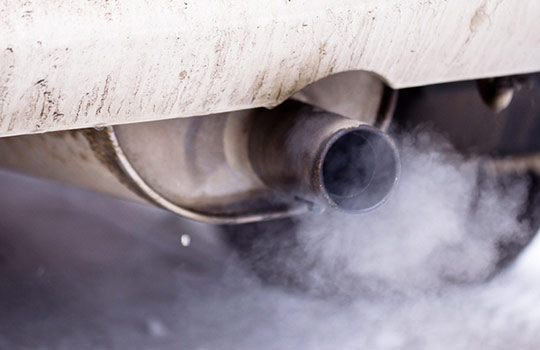David McCoy explains why we should tax diesel vehicles more.
 Supported by European legislation and domestic financial incentives, the UK has undergone a significant shift towards diesel vehicles over the past 15 years, which now account for almost half of all new car sales.
Supported by European legislation and domestic financial incentives, the UK has undergone a significant shift towards diesel vehicles over the past 15 years, which now account for almost half of all new car sales.
Diesel engines produce marginally lower carbon dioxide (CO2) emissions than petrol, but emit far more particulate matter (PM) and the harmful gas nitrogen dioxide (NO2). Thanks to investigations following the Volkswagen emissions testing scandal we now know that these emissions in “real world” driving conditions exceed the emissions readings in lab test conditions by up to twenty times, a figure which holds true for even the newest Euro-6 standard cars. Recent modelling has estimated that around 40% of NO2 and PM emissions in London are produced by diesel vehicles and that NO2 alone is responsible for 5,600 premature deaths in the city each year.
The landmark 2016 report by the Royal College of Physicians and the Royal College of Paediatrics and Child Health documents a range of adverse effects on health throughout the life-course, in particular on fetal development in utero and children’s lung development in childhood, as well as increased risks of cardiovascular and respiratory disease, obesity, diabetes and dementia in adulthood.
Monday 23 January saw London’s air pollution levels peak at 197 micrograms per cubic metre for PM on the air quality index. To put this into context, the air quality in London was worse than in Beijing that day, a city notorious for its toxic levels of air pollution. While Public Health England rightly advised people not to exercise outdoors, perhaps it could have done more to demand plans to clean up the city’s air. Although such days may make headlines, we now understand that long-term and chronic low-level exposure has greater negative health impacts than short-term spikes of high-level pollution. We also know that the majority of local authorities in the UK regularly breach NO2 legal limits in one or more areas.
We need to reduce the amount of diesel air pollution. This means fewer diesel cars on our roads. One step to achieving this is to reduce diesel car sales by removing the financial incentives to buy them: currently they are cheaper than petrol for equivalent engine size due the fact that the vehicle excise duty (“road tax”) is banded according to CO2 emissions alone.
This week Professor Jonathan Grigg, UK paediatrician on the respiratory health effects of air pollution in children, Professor Stephen Holgate, Chair of the RCP/RCPCH Working Party on Air Pollution and I are among signatories to a letter written to Phillip Hammond calling for an increase in vehicle excise duty (VED) on diesel vehicles in the March budget. A move required to account for the health costs of PM and NO2 emissions. Importantly, we propose that the VED would only apply to purchases of new diesel vehicles, so that current drivers of diesel cars are not unfairly penalised.
The money raised from this excise duty can then be used to fund diesel scrappage schemes, targeted at drivers of the dirtiest vehicles in towns and cities in which exposure is greatest. This would address the argument that drivers of such cars are being unfairly penalised by the introduction of Clean Air Zones, whilst shifting the cost onto society and away from the individual. The Mayor of London Sadiq Khan has also proposed enabling drivers to spend the money they receive from scrappage on car-pool scheme membership and alternative forms of transport, which would have the dual benefit of reducing the total number of cars on the road and the CO2 emissions associated with that.
With four of the world’s biggest cities—Athens, Paris, Mexico City and Madrid—already committed to banning diesel vehicles within the next decade and investing in walking and cycling infrastructure, city leaders in the UK need to—literally and metaphorically—get on their bikes to catch up with public demand for clean air.
As doctors and health professionals we are in a unique position to raise awareness of the health costs of pollution and advocate for the essential transition to clean and healthy transport. Acting on diesel and influencing new purchasing behaviour is just a start. We encourage anyone interested in supporting and building this campaign for clean and healthy transport to sign up here.
David McCoy, director of Medact and director and Global Health Taught Programme, Queen Mary University London.
Competing interests: None declared.
